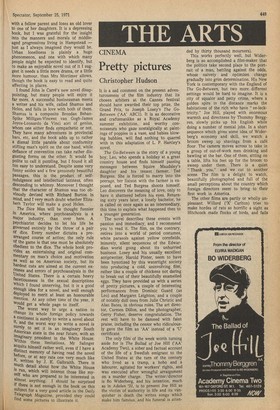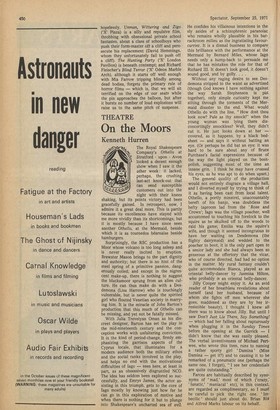CINEMA
Pretty pictures
Christopher Hudson
It is a sad comment on the present adventurousness of the film industry that its chosen arbiters at the Cannes festival should have awarded their top prize, the Grand Prix, to Joseph Losey's The Go Between ('AA' ABC1). It is as decorative and craftsmanlike as a Royal Academy summer exhibition, and worthy con noisseurs who gaze nostalgically at paintings of poppies in a vase, and babies blowing bubbles, will find nothing to quarrel with in this adaptation of L. P. Hartley's novel.
The Go-Between is the story of a young boy, Leo, who spends a holiday at a great country house and finds himself passing messages between Squire Maudsley's daughter and his tenant farmer, Ted Burgess. She is forced to marry into the peerage, her liaison with the farmer is exposed, and Ted Burgess shoots himself. Leo discovers the meaning of love, only to have it shattered before his eyes. Returning sixty years later, a lonely bachelor, he is called on once again as an intermediary, this time to explain what happened then to a younger generation.
The novel describes these events with passion and immediacy, and I recommend you to read it. The film, on the contrary, retires into a world of period costumes, white parasols against yellow cornfields, leisurely, silent sequences of the Edwardian world going about its unhurried business. Losey and his usually excellent scriptwriter, Harold Pinter, seem to have been hynotized by this watertight society into producing a cold, uninvolving film, rather like a couple of chickens not daring to break out of their beautifully enamelled eggs. Thty have provided us with a series of pretty pictures, a couple of interesting performances from Dominic Guard (as Leo) and Margaret Leighton, and a couple of notably dull ones from Julie Christic and Alan Bates, in obvious roles. The art director, Carmen Dillon, and the photographer, Gerry Fisher, deserve congratulation. The rest will have to be damned with faint praise, including the censor who ridiculously gave the film an 'AA' instead of a 'U' certificate.
The only film of the week worth turning aside for is The Ballad of Joe Hill ('AA' Academy Two), a sober and factual account of the life of a Swedish emigrant to the United States at the turn of the century who lived as a tramp, a hobo and a labourer, agitated for workers' rights, and was executed after wrongful arraignment on a murder charge. The writer/director is Bo Widerberg, and his intention, much as in Adalen '31, is to present Joe Hill as the victim of authority in life and its vanquisher in death (he writes songs which make him famous, and his funeral is atten ded by thirty thousand mourners).
This works perfectly well, but Widerberg is so accomplished a film-maker that the politics take second place to the portrait of a man, battling against the odds, whose naivety and optimism change gradually into grim determination. His New York is contemporary with the England of The Go-Between, but two more different settings would be hard to imagine. It is a city of squalor and petty crime, where a golden spire in the distance marks the habitations of the rich who have " ee-lecktricity." Joe Hill, played with enormous warmth and directness by Thommy Berggren, slowly picks up his English while doing a number of menial jobs. In a short sequence which gives some idea of Widerberg's economy and skill, we watch a broom sweep up shavings from a café floor. The camera moves across to take in a group of out-of-work men drinking and bawling at the bar. One of them, sitting on a table, lifts his feet up for the broom to sweep under them. There is a quiet " Thank you," and we cut to another scene. The film is a delight to watch, beautifully photographed and full of the small perceptions about the country which foreign directors seem to bring to their first work in America.
The other films are partly or wholly unpleasant. Willard ('X' Carlton) tries to make hordes of rats as horrific a sight as Hitchcock made flocks of birds, and fails ('X' Plaza) is a silly and repulsive film, throbbing with obsessional private school fantasies, about a class of schoolboys who push their form-master off a cliff and perssecute his replacement (David Hemmings, whom they unfortunately fail to push off a cliff). The Hunting Party ('X' London Pavilion) is beneath contempt; and Richard Fleischer's Blind Terror ('X' Odeon Marble Arch), although it starts off well enough with Mia Farrow tripping blindly among dead bodies, forgets the primary rule of horror films — which is, that we will sit terrified on the edge of our seats while the pin approaches the balloon, but after it bursts no number of loud explosions will raise us to the same pitch of suspense.



































 Previous page
Previous page